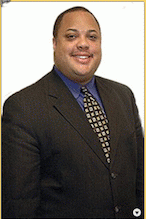Former Police Office/First Year Law Student Spearheads Organization Against Police Brutality
My guest today is Jonathan Newton, first-year law student at UDC (University of District of Columbia). Welcome to OpEdNews, Jonathan. You'd barely started law school early last fall when you became one of the lead organizers of a new organization, the NAAPB [the National Association Against Police Brutality]. Tell us how that came about, please.
Our first day of law school was Monday August 11, 2014. It was less than 48 hours after the August 9th shooting of Michael Brown in Ferguson, Missouri. About a month prior to that, in July, most of us watched the killing of Eric Garner by a New York police officer on video. The tension in the classroom was so thick you could cut it with a knife. We were just one year outside of the acquittal of George Zimmerman in the Trayvon Martin killing in Florida. Black Americans are facing many of the same issues again: racial profiling, the discretionary use of deadly force on an unarmed black person, and the failure of our justice system to offer justice to black people. The day of the Zimmerman acquittal in 2013, I had just finished writing a paper entitled "Racial Disparity in the Criminal Justice System" and during my research, I discovered the problem was much larger and more systemic than what many people knew.
Many of my classmates and I came to UDC School of Law to be lawyers to make a difference through social justice in the legal profession. Between the summer of 2013 and 2014, I became frustrated and tired of waiting for someone else or some organization to squarely address these issues and I realized this situation was not going to self-correct without people of conscience getting involved and thinking up solutions to address the problems in our criminal justice system. As a former police officer with a few years experience and someone who had my own adverse experience within the system, I felt my experience could help address the issue of police brutality and racially disparate abuse of discretion in the criminal justice system. I sketched out the idea on a scratchpad and started creating a logo and a Facebook page talking about the issues. In October, I drafted a concept paper and I reached out to my classmates to get involved and several of them answered the call.
Wow. Your law school experience really started off with a bang, no pun intended. Let's talk about your former career as a police officer, Jonathan. You're probably not the typical law student. I'd like to hear more about that before we move on.
This is a long story that involves abuse of authority within our justice system. My case had the common abuses that happen to black and brown people every day: fabricated statements, selective enforcement and excessive bail. It took a total system failure for what occurred to me to transpire. But it all started with a known false report by a sheriff. To sum up my experience as a cop, it was a complete surprise to find out how corrupt the entire system can be when left unchecked.
First you have to understand, I didn't come into law enforcement like the typical recruit. I was sought out by a charismatic and corrupt sheriff in a metropolitan suburb of Atlanta. Prior to that, I was a newspaper publisher and a small business owner. I was hired as a non-sworn Public Information Officer and appointed to a high-level position with no actual law enforcement background. Over my initial 18 months, I observed situations where people could do something illegal unknowingly, while thinking it was the normal operating standard because they were ordered to do it by a superior. I found myself involved in a situation like this and I could not readily get any internal help in blowing the whistle about it. When I did blow the whistle in November 2008, the sheriff immediately retaliated by lodging unfounded allegations against me and seeking arrest warrants in the final days of his tenure. Fortunately, a judge in his own county and one in another where he attempted to 'judge shop' were able to see his motives and both found there was no probable cause of a crime at all.
(Note: You can view every article as one long page if you sign up as an Advocate Member, or higher).







